樊景立版的组织公民行为量表
组织公民行为量表
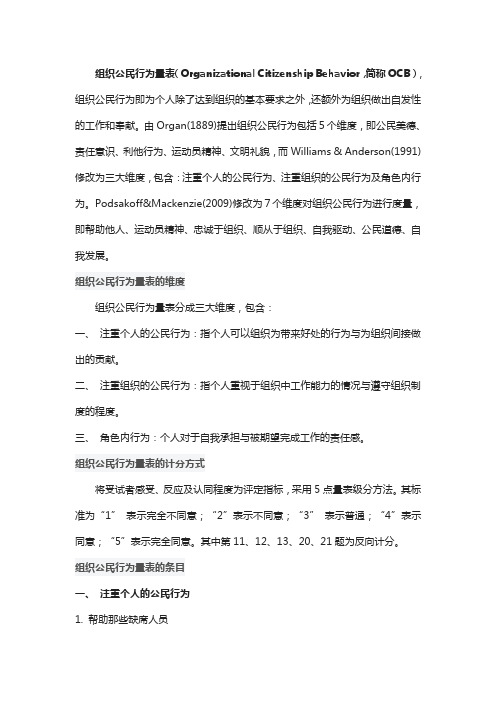
组织公民行为量表(Organizational Citizenship Behavior,简称OCB),组织公民行为即为个人除了达到组织的基本要求之外,还额外为组织做出自发性的工作和奉献。
由Organ(1889)提出组织公民行为包括5个维度,即公民美德、责任意识、利他行为、运动员精神、文明礼貌,而Williams & Anderson(1991) 修改为三大维度,包含:注重个人的公民行为、注重组织的公民行为及角色内行为。
Podsakoff&Mackenzie(2009)修改为7个维度对组织公民行为进行度量,即帮助他人、运动员精神、忠诚于组织、顺从于组织、自我驱动、公民道德、自我发展。
组织公民行为量表的维度组织公民行为量表分成三大维度,包含:一、注重个人的公民行为:指个人可以组织为带来好处的行为与为组织间接做出的贡献。
二、注重组织的公民行为:指个人重视于组织中工作能力的情况与遵守组织制度的程度。
三、角色内行为:个人对于自我承担与被期望完成工作的责任感。
组织公民行为量表的计分方式将受试者感受、反应及认同程度为评定指标,采用5点量表级分方法。
其标准为“1”表示完全不同意;“2”表示不同意;“3”表示普通;“4”表示同意;“5”表示完全同意。
其中第11、12、13、20、21题为反向计分。
组织公民行为量表的条目一、注重个人的公民行为1. 帮助那些缺席人员2. 帮助那些工作量繁重的人①完全不同意②不同意③普通④同意⑤完全同意3. 没有被要求时仍然协助上司完成他(她)的工作①完全不同意②不同意③普通④同意⑤完全同意4. 抽时间倾听同事遇到的问题和担忧①完全不同意②不同意③普通④同意⑤完全同意5. 主动自觉地帮助新员工①完全不同意②不同意③普通④同意⑤完全同意6. 对其他人员表达自我关注①完全不同意②不同意③普通④同意⑤完全同意7. 传递资讯给同事①完全不同意②不同意③普通④同意⑤完全同意二、注重组织的公民行为8. 对工作的参与度高于标准要求9. 提高对工作中能力欠缺的关注度①完全不同意②不同意③普通④同意⑤完全同意10. 本不该休息的时候停止工作①完全不同意②不同意③普通④同意⑤完全同意11. 花大量的时间打私人电话①完全不同意②不同意③普通④同意⑤完全同意12. 对工作中无关重要的事情经常抱怨①完全不同意②不同意③普通④同意⑤完全同意13. 节约和保护组织财产①完全不同意②不同意③普通④同意⑤完全同意14. 为维护秩序而遵守非正式的制度①完全不同意②不同意③普通④同意⑤完全同意三、角色内行为15. 恰当的完成布置的工作任务16. 能履行工作描述中明确指定的责任①完全不同意②不同意③普通④同意⑤完全同意17. 能完成被期望的任务①完全不同意②不同意③普通④同意⑤完全同意18. 满足工作要求的行为表现①完全不同意②不同意③普通④同意⑤完全同意19. 参与可直接对他(她)的绩效产生影响的活动①完全不同意②不同意③普通④同意⑤完全同意20. 忽视了他(她)本有义务去做的工作①完全不同意②不同意③普通④同意⑤完全同意21. 没有承担最基本的责任①完全不同意②不同意③普通④同意⑤完全同意。
组织公民行为

四、组织公民行为与管理
• 注重招聘与选拔 • 加强员工培训与教育 • 丰富的工作任务 • 建设企业文化 • 建立有效激励机制
组织行为学
• 3)自愿合作行为能使组织更有效率地利用资源, 减少不必要的资源争夺,特别是能更有效地利用 稀缺资源。
• 4)促进团队成员之间以及跨团队的工作协调。 组织公民行为的一个核心特点是组织成员能够从 组织的大局出发考虑问题,这样会使组织中的群 体利益和个体利益都得到有效的协调。
• 5)通过创造一个使人更加愉快工作的环境,从而 吸引和保留高素质的员工。组织成员做出较多组 织公民行为的环境是一个充满互相合作、互相支 持的环境,这样的环境一定是一个非常适合工作 的有吸引力的环境。
• 4)组织服从(organizational compliance):对组织 中的规则、程序的内化和接纳,在无人监督的情 况下也自觉遵守。
• 5)个体主动性(individual initiative):在工作 任务上自觉地达到远超出最低标准的水平, 包括自觉表现出创造性的行为,表现出格外 高度的热情和努力,自觉承担额外的工作责 任,并鼓励组织中他人也这样做。
• 1)组织公民行为充当了组织运行的润滑剂,减少 人际矛盾冲突。例如,利他和助人行为就起到了 这方面作用,主动为他人提供方便,帮助他人, 维护人际和谐,从而保证了工作关系的顺畅。
• 2)能提升同事和管理者的生产力。例如,通过帮 助有困难的同事就提高了同事的生产力;另外, 员工主动协调人际关系、主动承担工作,减少管 理者在冲突协调、工作分派方面耗费不必要的精 力,从而使管理者的精力能够放在更重要的事情 上;员工积极为工作献计献策也更有利于管理者 工作的开展。
组织行为学
组织公民行为
• 一、组织公民行为的概念及作用 • 二、组织公民行为的维度 • 三、组织公民行为的影响因素 • 四、组织公民行为与管理
职业健康心理学研究的因变量
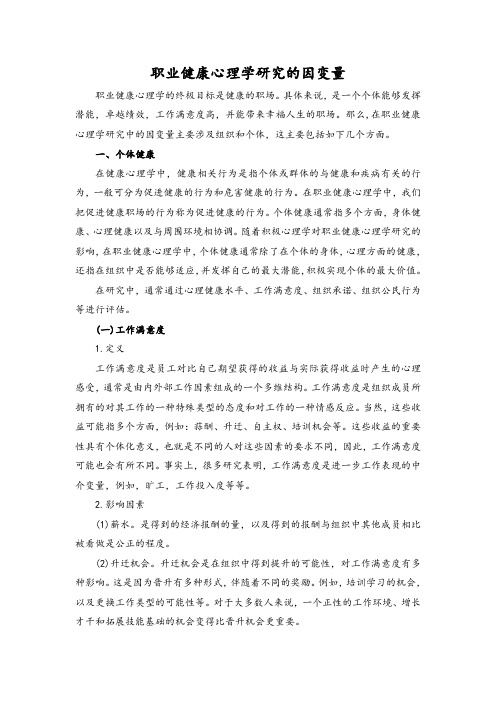
职业健康心理学研究的因变量职业健康心理学的终极目标是健康的职场。
具体来说,是一个个体能够发挥潜能,卓越绩效,工作满意度高,并能带来幸福人生的职场。
那么,在职业健康心理学研究中的因变量主要涉及组织和个体,这主要包括如下几个方面。
一、个体健康在健康心理学中,健康相关行为是指个体或群体的与健康和疾病有关的行为,一般可分为促进健康的行为和危害健康的行为。
在职业健康心理学中,我们把促进健康职场的行为称为促进健康的行为。
个体健康通常指多个方面,身体健康、心理健康以及与周围环境相协调。
随着积极心理学对职业健康心理学研究的影响,在职业健康心理学中,个体健康通常除了在个体的身体,心理方面的健康,还指在组织中是否能够适应,并发挥自己的最大潜能,积极实现个体的最大价值。
在研究中,通常通过心理健康水平、工作满意度、组织承诺、组织公民行为等进行评估。
(一)工作满意度1.定义工作满意度是员工对比自己期望获得的收益与实际获得收益时产生的心理感受,通常是由内外部工作因素组成的一个多维结构。
工作满意度是组织成员所拥有的对其工作的一种特殊类型的态度和对工作的一种情感反应。
当然,这些收益可能指多个方面,例如:蒜酬、升迁、自主权、培训机会等。
这些收益的重要性具有个体化意义,也就是不同的人对这些因素的要求不同,因此,工作满意度可能也会有所不同。
事实上,很多研究表明,工作满意度是进一步工作表现的中介变量,例如,旷工,工作投入度等等。
2.影响因素(1)薪水。
是得到的经济报酬的量,以及得到的报酬与组织中其他成员相比被看做是公正的程度。
(2)升迁机会。
升迁机会是在组织中得到提升的可能性,对工作满意度有多种影响。
这是因为晋升有多种形式,伴随着不同的奖励。
例如,培训学习的机会,以及更换工作类型的可能性等。
对于大多数人来说,一个正性的工作环境、增长才干和拓展技能基础的机会变得比晋升机会更重要。
(3)上级的支持。
就是上级提供技术帮助和行为支持的能力。
影响工作满意度的上级管理的风格有两个维度:一是员工中心性,可以通过上级对于员工的个人关注程度来测量。
樊景立 组织公民行为量表组织公平量表
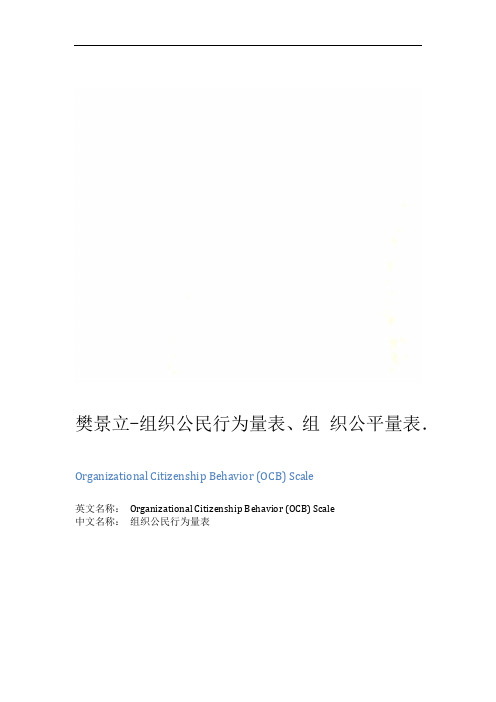
樊景立-组织公民行为量表、组织公平量表.Organizational Citizenship Behavior (OCB) Scale英文名称:Organizational Citizenship Behavior (OCB) Scale中文名称:组织公民行为量表作者:Farh, J. L., Earley, P. C., & Lin, S. C.出处:Farh, J. L., Earley, P. C., & Lin, S. C. “Impetus for action: A cultural analysis of justice and organizational citizenship behavior in Chinese society.”Administrative Science Quarterly, 1997, 42, 421-444.简介:条目:部属的工作行为:以下列叙述来描述他(她)的行为您是否同意?请逐项阅读后填答。
1-非常不同意5-有点同意2-相当不同意6-相当同意3-有点不同意7-非当同意4-不能确定Identification with the company认同组织Eager to tell outsiders good news about the company and clarify their misunderstandings主动对外介绍或宣传公司优点,或澄清他人对公司的误解。
Willing to stand up to protect the reputation of the company.努力维护公司形象,并积极参与有关活动。
Makes constructive suggestions that can improve the operation of the company. 主动提出建设性的改善方案,供公司有关单位参考。
.Actively attends company meetings.以积极的态度参与公司内相关会议。
组织公民行为研究评析
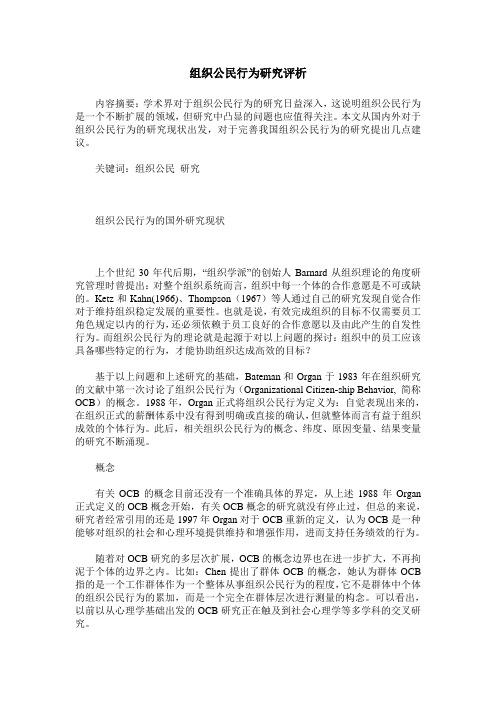
组织公民行为研究评析内容摘要:学术界对于组织公民行为的研究日益深入,这说明组织公民行为是一个不断扩展的领域,但研究中凸显的问题也应值得关注。
本文从国内外对于组织公民行为的研究现状出发,对于完善我国组织公民行为的研究提出几点建议。
关键词:组织公民研究组织公民行为的国外研究现状上个世纪30年代后期,“组织学派”的创始人Barnard从组织理论的角度研究管理时曾提出:对整个组织系统而言,组织中每一个体的合作意愿是不可或缺的。
Ketz和Kahn(1966)、Thompson(1967)等人通过自己的研究发现自觉合作对于维持组织稳定发展的重要性。
也就是说,有效完成组织的目标不仅需要员工角色规定以内的行为,还必须依赖于员工良好的合作意愿以及由此产生的自发性行为。
而组织公民行为的理论就是起源于对以上问题的探讨:组织中的员工应该具备哪些特定的行为,才能协助组织达成高效的目标?基于以上问题和上述研究的基础,Bateman和Organ于1983年在组织研究的文献中第一次讨论了组织公民行为(Organizational Citizen-ship Behavior, 简称OCB)的概念。
1988年,Organ正式将组织公民行为定义为:自觉表现出来的,在组织正式的薪酬体系中没有得到明确或直接的确认,但就整体而言有益于组织成效的个体行为。
此后,相关组织公民行为的概念、纬度、原因变量、结果变量的研究不断涌现。
概念有关OCB的概念目前还没有一个准确具体的界定,从上述1988年Organ 正式定义的OCB概念开始,有关OCB概念的研究就没有停止过,但总的来说,研究者经常引用的还是1997年Organ对于OCB重新的定义,认为OCB是一种能够对组织的社会和心理环境提供维持和增强作用,进而支持任务绩效的行为。
随着对OCB研究的多层次扩展,OCB的概念边界也在进一步扩大,不再拘泥于个体的边界之内。
比如:Chen提出了群体OCB的概念,她认为群体OCB 指的是一个工作群体作为一个整体从事组织公民行为的程度,它不是群体中个体的组织公民行为的累加,而是一个完全在群体层次进行测量的构念。
樊景立-组织公民行为量表、组织公平量表说课材料
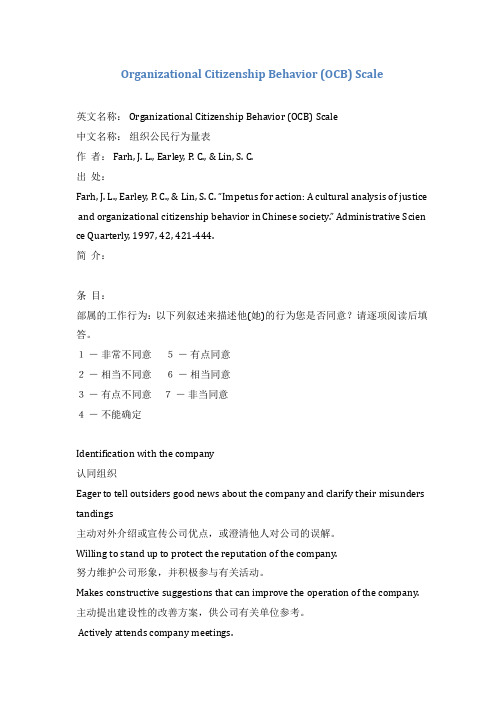
Organizational Citizenship Behavior(OCB)Scale英文名称:Organizational Citizenship Behavior(OCB)Scale中文名称:组织公民行为量表作者:Farh,J.L.,Earley,P.C.,&Lin,S.C.出处:Farh,J.L.,Earley,P.C.,&Lin,S.C.“Impetus for action:A cultural analysis of justice and organizational citizenship behavior in Chinese society.”Administrative Scien ce Quarterly,1997,42,421-444.简介:条目:部属的工作行为:以下列叙述来描述他(她)的行为您是否同意?请逐项阅读后填答。
1-非常不同意5-有点同意2-相当不同意6-相当同意3-有点不同意7-非当同意4-不能确定Identification with the company认同组织Eager to tell outsiders good news about the company and clarify their misunders tandings主动对外介绍或宣传公司优点,或澄清他人对公司的误解。
Willing to stand up to protect the reputation of the company.努力维护公司形象,并积极参与有关活动。
Makes constructive suggestions that can improve the operation of the company.主动提出建设性的改善方案,供公司有关单位参考。
Actively attends company meetings.以积极的态度参与公司内相关会议。
基于性别的组织公民行为对工作绩效影响的实证研究
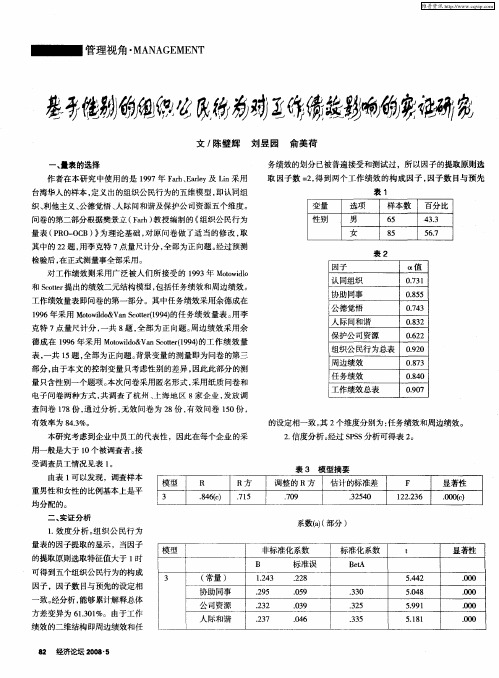
F
122 6 2. 3
显著性
. o ̄ o ( o )
重男性和女性 的比例基本上是平 均分配的。
二 、 证 分析 实
系数( ( a 部分 ) )
1效度分 析。 织公 民行 为 . 组
量 表 的 因 子提 取 的显 示 , 当因 子
模型
非标准化系数 B 标准误 .2 28 .5 09 .3 09
.3 35
.o 00 .o 00 .o 0O
.o 00
因子 ,因子数 目与预先 的设定相
一
5 4 .8 0 5 9 . 1 9
51 1 .8
致。 经分析 , 能够累计解释总体
方差变异为 6 . 1 由于工作 1 0 %。 3
绩效的二维结构即周边绩效和任
8 经济论坛 2 0 5 2 0 8・
维普资讯
M N GM N ・ A A E E T管理视角 ■●■_
民行 为和工作绩效 总量 表的 Co — rn
表 4 模 型 摘 要
bc ah信度可以接受 。 F
5 .4 2 5 4
模 型
3
R
.4 ( 8 9c )
R方
.2 71
表1
、
量表的选择
作者 在本 研究 中使用 的是 19 9 7年 F r、 a e 及 “n采用 ahE r y l 台湾华人 的样本 , 定义 出的组织公民行 为的五维模型 , 即认 同组
织、 利他主义、 公德觉悟 、 人际间和谐及保护公 司资源五个维度 。
变量
性 别
选项
男 女
模型 非标准化系数 B 3 ( 常量 ) 协助 同事
人 际 和谐
创业初期员工组织公民行为对经营绩效的影响
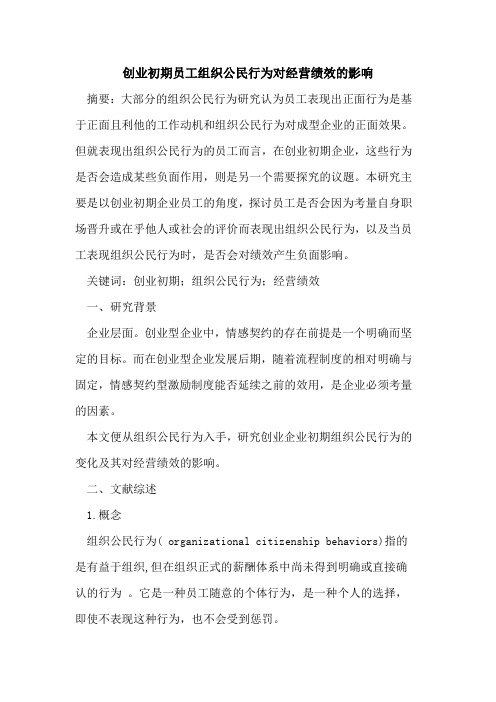
创业初期员工组织公民行为对经营绩效的影响摘要:大部分的组织公民行为研究认为员工表现出正面行为是基于正面且利他的工作动机和组织公民行为对成型企业的正面效果。
但就表现出组织公民行为的员工而言,在创业初期企业,这些行为是否会造成某些负面作用,则是另一个需要探究的议题。
本研究主要是以创业初期企业员工的角度,探讨员工是否会因为考量自身职场晋升或在乎他人或社会的评价而表现出组织公民行为,以及当员工表现组织公民行为时,是否会对绩效产生负面影响。
关键词:创业初期;组织公民行为;经营绩效一、研究背景企业层面。
创业型企业中,情感契约的存在前提是一个明确而坚定的目标。
而在创业型企业发展后期,随着流程制度的相对明确与固定,情感契约型激励制度能否延续之前的效用,是企业必须考量的因素。
本文便从组织公民行为入手,研究创业企业初期组织公民行为的变化及其对经营绩效的影响。
二、文献综述1.概念组织公民行为( organizational citizenship behaviors)指的是有益于组织,但在组织正式的薪酬体系中尚未得到明确或直接确认的行为。
它是一种员工随意的个体行为,是一种个人的选择,即使不表现这种行为,也不会受到惩罚。
研究者们对组织公民行为的维度尚未达成共识,organ(1988a)将组织公民行为分为五大类:利他(altruism)、事先知会(courtesy)、责任意识(conscientious)、运动员精神(sportsmanship)和公民道德(civic virtue)。
podsakoff对现有的组织公民行为模型进行归纳总结,概括出组织公民行为的七个相对独立的维度:助人为乐(helping behavior)、运动员精神(sportsmanship)、组织忠诚(organizational loyalty)、组织遵从(organizational compliance)、个人主动性(individual initiative)、公民道德(civic virtue)和自我发展(self development)。
《组织公民行为》课件

目录
• 组织公民行为概述 • 组织公民行为的类型 • 组织公民行为的影响因素 • 如何提升组织公民行为 • 组织公民行为与组织绩效的关系 • 案例分析
01
组织公民行为概述
定义与特点
定义
组织公民行为是指在组织正式的 薪酬体系中未明确规定,但能够 对组织或个人产生积极影响的自 觉、自发的个体行为。
领导风格
01
02
03
变革型领导
变革型领导风格能够激发 员工的内在动机和自我发 展,从而促进组织公民行 为的表现。
服务型领导
服务型领导关注员工的需 要和发展,通过提供支持 和资源来促进员工的组织 公民行为。
情境领导
根据员工的成熟度和需求 ,采取不同的领导风格, 能够更好地激发员工的组 织公民行为。
工作环境
自我效能感强的员工对自己的能 力有信心,更愿意主动承担责任 和参与组织活动。
组织文化
团队合作
组织文化中强调团队合作和互相支持,能够激发员工表现出更多 的组织公民行为。
创新氛围
鼓励创新和接受新思想的组织文化,能够激发员工的主动性和创造 性,从而表现出更多的组织公民行为。
公正与公平
组织文化中强调公正和公平,能够提高员工的满意度和忠诚度,从 而增加组织公民行为。
详细描述
某公司注重组织文化建设,通过倡导诚信、创新、团结等价值观,营造积极向 上的工作氛围。同时,公司还鼓励员工之间的交流和合作,促进信息的流通和 知识的共享,提高组织的创新能力和竞争力。
感谢您的观看
THANKS
的共赢。
组织公民行为与绩效的关系
正向关系
组织公民行为对个人绩效和组织绩效具有正 向影响,能够提高个人和组织的工作效率和 质量。
组织公民行为的研究现状
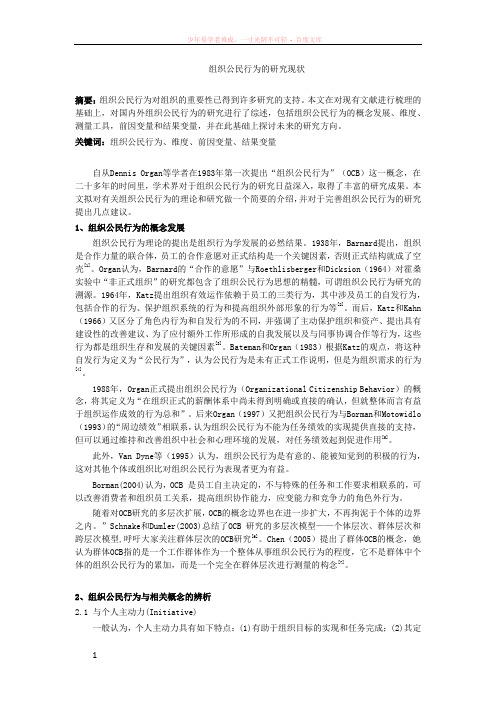
组织公民行为的研究现状摘要:组织公民行为对组织的重要性已得到许多研究的支持。
本文在对现有文献进行梳理的基础上,对国内外组织公民行为的研究进行了综述,包括组织公民行为的概念发展、维度、测量工具,前因变量和结果变量,并在此基础上探讨未来的研究方向。
关键词:组织公民行为、维度、前因变量、结果变量自从Dennis Organ等学者在1983年第一次提出“组织公民行为”(OCB)这一概念,在二十多年的时间里,学术界对于组织公民行为的研究日益深入,取得了丰富的研究成果。
本文拟对有关组织公民行为的理论和研究做一个简要的介绍,并对于完善组织公民行为的研究提出几点建议。
1、组织公民行为的概念发展组织公民行为理论的提出是组织行为学发展的必然结果。
1938年,Barnard提出,组织是合作力量的联合体,员工的合作意愿对正式结构是一个关键因素,否则正式结构就成了空壳[1]。
Organ认为,Barnard的“合作的意愿”与Roethlisberger和Dicksion(1964)对霍桑实验中“非正式组织”的研究都包含了组织公民行为思想的精髓,可谓组织公民行为研究的溯源。
1964年,Katz提出组织有效运作依赖于员工的三类行为,其中涉及员工的自发行为,包括合作的行为、保护组织系统的行为和提高组织外部形象的行为等[2]。
而后,Katz和Kahn (1966)又区分了角色内行为和自发行为的不同,并强调了主动保护组织和资产、提出具有建设性的改善建议、为了应付额外工作所形成的自我发展以及与同事协调合作等行为,这些行为都是组织生存和发展的关键因素[3]。
Bateman和Organ(1983)根据Katz的观点,将这种自发行为定义为“公民行为”,认为公民行为是未有正式工作说明,但是为组织需求的行为[4]。
1988年,Organ正式提出组织公民行为(Organizational Citizenship Behavior)的概念,将其定义为“在组织正式的薪酬体系中尚未得到明确或直接的确认,但就整体而言有益于组织运作成效的行为总和”。
威权领导对于员工组织公民行为的影响:心理契约在其中的中介作用
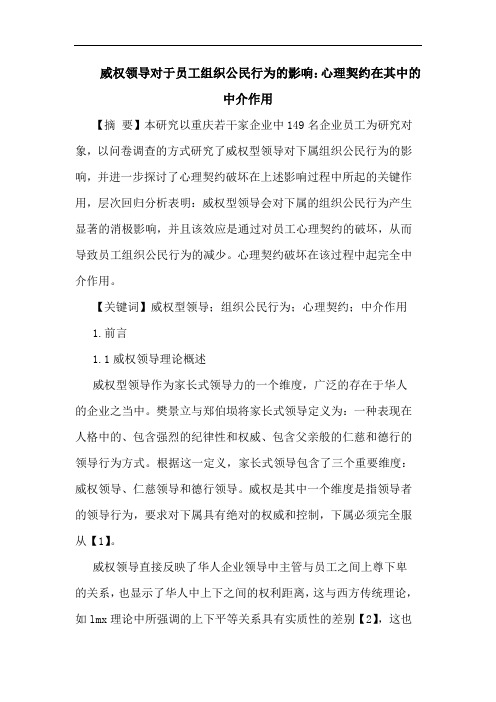
威权领导对于员工组织公民行为的影响:心理契约在其中的中介作用【摘要】本研究以重庆若干家企业中149名企业员工为研究对象,以问卷调查的方式研究了威权型领导对下属组织公民行为的影响,并进一步探讨了心理契约破坏在上述影响过程中所起的关键作用,层次回归分析表明:威权型领导会对下属的组织公民行为产生显著的消极影响,并且该效应是通过对员工心理契约的破坏,从而导致员工组织公民行为的减少。
心理契约破坏在该过程中起完全中介作用。
【关键词】威权型领导;组织公民行为;心理契约;中介作用1.前言1.1威权领导理论概述威权型领导作为家长式领导力的一个维度,广泛的存在于华人的企业之当中。
樊景立与郑伯埙将家长式领导定义为:一种表现在人格中的、包含强烈的纪律性和权威、包含父亲般的仁慈和德行的领导行为方式。
根据这一定义,家长式领导包含了三个重要维度:威权领导、仁慈领导和德行领导。
威权是其中一个维度是指领导者的领导行为,要求对下属具有绝对的权威和控制,下属必须完全服从【1】。
威权领导直接反映了华人企业领导中主管与员工之间上尊下卑的关系,也显示了华人中上下之间的权利距离,这与西方传统理论,如lmx理论中所强调的上下平等关系具有实质性的差别【2】,这也就说明了威权领导对于华人特有领导方式研究的实际意义。
1.2组织公民行为理论概述组织公民行为的概念由organ于1988年提出:指由员工自发进行的,在组织正式的薪酬体系中尚未得到明确的或直接的承认,但就整体而言有益于组织运作的功能和效率的行为总和。
【3】威廉和安德森将组织公民行为分为指向个体的组织公民行为(ocbi)和指向组织的组织公民行为(ocbo)【4】,这一分类在后来的研究中得到了广泛的应用。
本研究即是从ocbi和ocbo两个维度,对员工的组织公民行为进行调查测量分析。
1.3心理契约理论概述心理契约是由argyris于1960年提出,用来描述雇员与企业双方不成文的、内隐的契约或相互期望,后来把它界定为雇员对雇佣关系中双方相互负责的一种信念。
樊景立版的组织公民行为量表
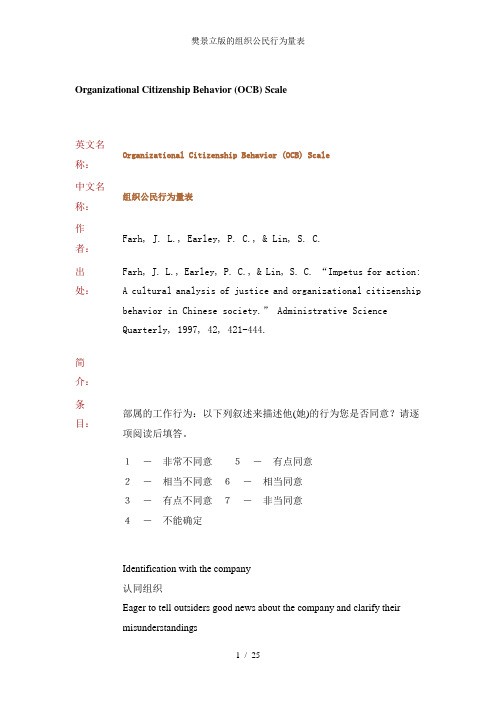
Organizational Citizenship Behavior (OCB) Scale英文名称:Organizational Citizenship Behavior (OCB) Scale 中文名称:组织公民行为量表作者:Farh, J. L., Earley, P. C., & Lin, S. C.出处:Farh, J. L., Earley, P. C., & Lin, S. C. “Impetus for action: A cultural analysis of justice and organizational citizenship behavior in Chinese society.” Administrative Science Quarterly, 1997, 42, 421-444.简介:条目:部属的工作行为:以下列叙述来描述他(她)的行为您是否同意?请逐项阅读后填答。
1-非常不同意5-有点同意2-相当不同意6-相当同意3-有点不同意7-非当同意4-不能确定Identification with the company认同组织Eager to tell outsiders good news about the company and clarify their misunderstandings主动对外介绍或宣传公司优点,或澄清他人对公司的误解。
Willing to stand up to protect the reputation of the company.努力维护公司形象,并积极参与有关活动。
Makes constructive suggestions that can improve the operation of the company.主动提出建设性的改善方案,供公司有关单位参考。
Actively attends company meetings.以积极的态度参与公司内相关会议。
樊景立-组织公民行为量表、组织公平量表

樊景立-组织公民行为量表、组织公平量表Orga ni zati onal Citize nship Behavior (OCB) Scale英文名称:Orga ni zatio nal Citize nship Behavior (OCB) Scale中文名称:组织公民行为量表 作 者:Farh, J. L., Earley, P C., & Lin, S. C.出处:Farh, J. L., Earley, P C., & Lin, S. C. “ Impetusfor action: A cultural analysis of j ustice and orga ni zati onal citize nship behavior in Chin ese rative ScienceQuarterly, 1997, 42, 421-444.简介:条目:以下列叙述来描述他(她)的行为您是否同意?请逐项阅读后填答。
4 —不能确定Identification with the company认同组织Eager to tell outsiders good n ews about the compa ny and clarify their mis un dersta ndings 主动对外介绍或宣传公司优点,或澄清他人对公司的误解。
Willi ng to sta nd up to protect the reputati on of the compa ny.努力维护公司形象,并积极参与有关活动。
Makes con structive suggesti ons that can improve the operati on of the comp any.主动提出建设性的改善方案,供公司有关单位参考Actively atte nds compa ny meet in gs.以积极的态度参与公司内相关会议。
组织与管理研究的实证方法(2008年北京大学出版社出版的图书

版的图书
2008年北京大学出版社出版的图书
01 内容简介
03 作者简介
目录
02 图书目录 04 推荐
《组织与管理研究的实证方法》是2008年6月1日北京大学出版社出版的图书,作者是陈晓萍、徐淑英、樊景 立。
内容简介
《组织与管理研究的实证方法》分五个部分:“科学研究的目的和过程”、“管理学的研究方法”、“管理 学研究中的测量统计方法”、“研究发表的旅程”以及附录。全书立足于思维方式、理论构建以及管理研究的全 过程,介绍了组织与管理研究中的各种实证方法,并在附录中给出了组织与管理研究方法论的经典文献,对研究 者具有极高的参考价值。
图书目录
引言如何在一流期刊上发表管理学研究论文? 一流管理学期刊 为什么要发表? 发表论文的策略 投稿常犯的错误 参考文献 第一部分科学研究的目的和过程 第一章科学过程与研究设计 本章大纲 一、导言与基本概念 二、科学研究过程
作者简介
陈晓萍,华盛顿大学福斯特商学院(Michael G.FosterSchool ofBusiness)组织管理学系教授,中国管 理研究国际学会现任主席。研究领域包括合作与竞争、跨文化管理、回报行为以及中国人的关系等。
徐淑英,亚利桑那州立大学凯里商学院(CarevSchool of Business)摩托罗拉国际管理讲座教授,中国管 理研究国际学会首任主席。曾任《美国管理学会学报》(Academy of ManagementJournal)的主编,也是《组 织管理研究》(Management and OrganizationReview)的创刊主编。研究领域包括组织人口学、雇佣关系和 组织文化,尤其是中国情境下的管理研究。
感谢观看
组织公民行为对组织内部知识转移的促进作用研究
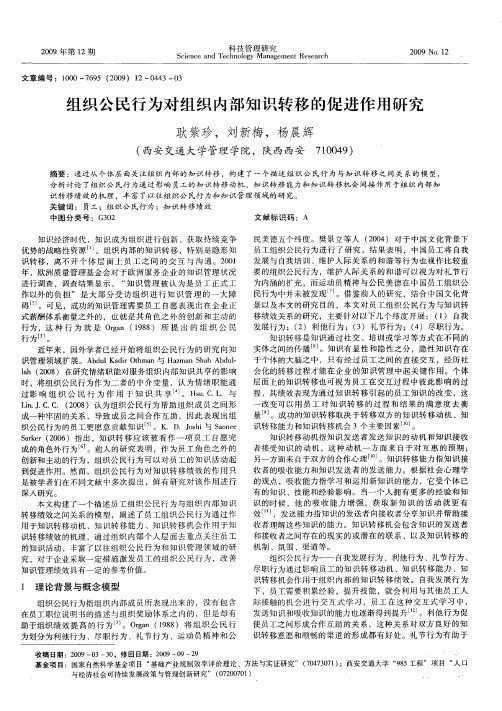
民美 德五个纬度。樊景立等人 ( 04 2 0 )对 于 中国文化 背景下 员 工 组 织 公 民 行 为 进 行 了 研 究 ,结 果 表 明 , 中 国员 工 将 自我 发展 与 自我培训 、维护人 际关 系 的和谐等行 为也视作 比较重 要 的组 织 公 民行 为 ,维 护 人 际 关 系 的 和 谐 可 以 视 为 对 礼 节 行 为内涵的扩充 ,而运动员精 神与公 民美德在 中国员工 组织公 民行 为中并未被发现川 。借鉴前 人 的研究 ,结合 中国文化背 景 以 及本 文 的 研 究 目的 ,本 文 对 员 工 组 织 公 民 行 为 与 知 识 转 移绩效关 系的研 究 ,主要针对 以下几个纬度 开展 :( ) 自我 1 发展行 为 ;( )利他行为 ;( )礼节行为 ;( )尽职行为。 2 3 4 知识 转 移 是 知 识 通 过 社 交 、培 训 或 学 习 等 方 式 在 不 同 的 实体 之间的传播 。知识有显性 和隐性 之分 ,隐性知 识存在 于个 体的大脑之 中,只有 经过员 工之 间的直接交 互 ,经历社 会 化的转移过程才能在 企业 的知识管理 中起关键 作用。个体 层 面上 的知 识 转 移 也 可 视 为 员 工 在 交 互 过 程 中彼 此 影 响 的 过 程 ,其绩效表 现为通过知识 转移 引起的员工 知识 的改 变 ,这 改 变可 以 用 员 工 对 知 识 转 移 的 过 程 和 结 果 的 满 意 度 去 衡 量 J 。成 功 的知 识 转 移 取 决 于 转 移 双 方 的知 识 转 移 动 机 、知 识 转 移 能 力 和 知 识 转 移 机 会 3个 主要 因 素 …。
知识 转 移 动 机 指 知 识 发 送 者 发 送 知 识 的 动机 和 知 识 接 收 者 接 受知 识 的 动 机 ,这 种 动 机 一 方 面 来 自于 对 互 惠 的 预 期 ; 另一方 面来 自于双方的合作心理 …。知识转移能力指 知识 接 收者 的 吸 收 能 力 和 知 识 发 送 者 的发 送 能 力 。根 据 社 会 心 理 学 的观点 ,吸收能力指学 习和运用新 知识 的能 力 ,它受个 体已 有 的 知识 、技 能 和 经 验 影 响 。 当 一 个 人 拥 有 更 多 的 经 验 和 知
浅谈管理中的组织公民行为——以高校教师为例
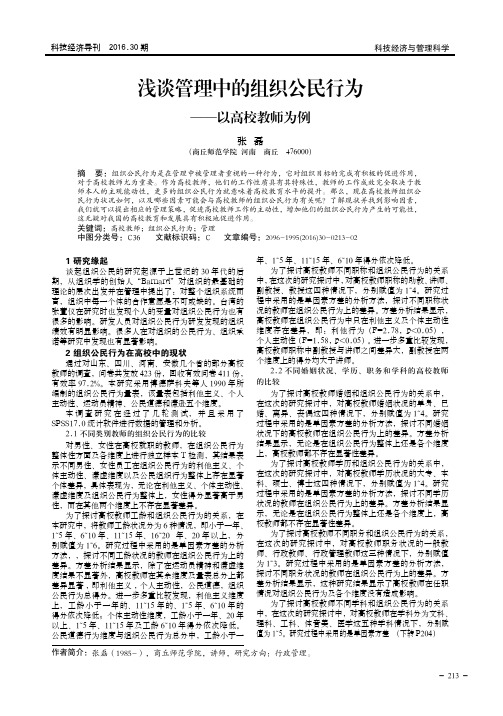
科技经济与管理科学科技经济导刊 2016.30期浅谈管理中的组织公民行为——以高校教师为例张 磊(商丘师范学院 河南 商丘 476000)1 研究缘起谈起组织公民的研究起源于上世纪的30年代的后期,从组织学的创始人“Barnard”对组织的最基础的理论的层次出发并在管理中提出了:对整个组织系统而言,组织中每一个体的合作意愿是不可或缺的。
台湾的张萱仪在研究时也发现个人的变量对组织公民行为也有很多的影响。
研发人员对组织公民行为研发发现的组织绩效有明显影响。
很多人在对组织的公民行为、组织承诺等研究中发现也有显著影响。
2 组织公民行为在高校中的现状通过对山东、四川、河南、安徽几个省的部分高校教师的调查,问卷共发放423份,回收有效问卷411份,有效率97.2%。
本研究采用博德萨科夫等人1990年所编制的组织公民行为量表,该量表包括利他主义、个人主动性、运动员精神、公民道德和谦逊五个维度。
本调查研究在经过了几轮测试,并且采用了SPSS17.0统计软件进行数据的管理和分析。
2.1不同类别教师的组织公民行为的比较对男性、女性在高校就职的教师,在组织公民行为整体性方面及各维度上进行独立样本T检测,其结果表示不同男性、女性员工在组织公民行为的利他主义、个体主动性、谦虚维度以及公民组织行为整体上存在显著个体差异,具体表现为,无论在利他主义、个体主动性、谦虚维度及组织公民行为整体上,女性得分显著高于男性,而在其他两个维度上不存在显著差异。
为了探讨高校教师工龄和组织公民行为的关系,在本研究中,将教师工龄状况分为6种情况,即小于一年、1~5年、6~10年、11~15年、16~20 年、20年以上,分别赋值为1~6。
研究过程中采用的是单因素方差的分析方法,,探讨不同工龄状况的教师在组织公民行为上的差异。
方差分析结果显示,除了在运动员精神和谦虚维度结果不显著外,高校教师在其余维度及量表总分上都差异显著,即利他主义,个人主动性,公民道德,组织公民行为总得分。
助人为乐与组织氛围的关联研究

摘要组织公民行为中的助人为乐行为是指组织中的员工自愿帮助他人处理或防止工作中出现的问题,能够从整体上有利于提高组织功能和效率。
组织氛围是指组织成员对于自身所处的组织环境的各种特征的主观认知和感受,对组织成员的影响有着非常重要的作用。
虽然两者之间相互影响作用和关系是近年来该领域的研究热点,但其中就组织公民行为对组织氛围的影响作用研究在国内领域还处于空白阶段。
本研究在总结以往有关组织氛围和组织公民行为的研究成果的基础之上,直接将组织公民行为其中一个维度——助人为乐作为自变量,以组织氛围各维度作为因变量,直接研究分析助人为乐对组织氛围各维度的直接影响作用,探索这一空白领域的研究。
研究结果如下:1.助人为乐与组织氛围各维度之间均呈现显着相关关系。
2.线性回归分析显示:助人为乐与组织氛围各维度是显着正相关,但每个回归方程的拟合度很低,这表示助人为乐对组织氛围的直接影响作用较小,很可能是与组织公民行为其他维度或个人因素共同影响组织氛围。
本研究的意义在于通过实证研究成果探索这一理论领域发展的可能性,并对该领域的后续研究提供参考依据,也希望能够在管理实践中有所运用。
关键词:助人为乐,组织氛围,实证研究AbstractHelping behavior that is one of the dimensions of organizational citizenship behavior (OCB) refers to employee volunteer to help others deal with or prevent problems in the work. It can be conducive to improving organizational function and efficiency. Organizational climate refers to the subjective awareness or feelings of the members for the various features of the organizational environment, and it’s very important for members. Although the study of the relationship between OCB and organizational climate is a hot topic in recent years,but there are few researchers focus on the direct impact of helping behavior on organizational climate and its dimensions.This study, which is based on the conclusions of past research on organizational climate and organizational citizenship behavior, helping behavior is the only one independent variable and dimensions of organizational climate as the dependent variable, and study the relationship of them.Here is the conclusion.1.There exist a significant correlation between helping behavior and dimensions of organizational climate.2.The results of the Linear regression analysis show that,helping behavior is positively associated with dimensions of OCB,but score about the multiple correlation coefficient is very low, and it’s probably means that organizational climate will be influence by more than one factor which maybe include other dimensions of organizational citizenship behavior.The significance of the empirical study is that its conclusion will offer some reference for the further research, and also hope to be able to use to management practice. Keywords: Helping Behavior,Organizational Climate,Empirical Study目录第一章绪论研究背景与意义研究背景随着全球性的人力资源重要性在战略层面的比重越来越大,人力资源管理的各项职能如培训、薪酬、绩效管理以及留住人力资源等职能也越趋于受到重视。
组织文化对员工组织公民行为影响作用的研究
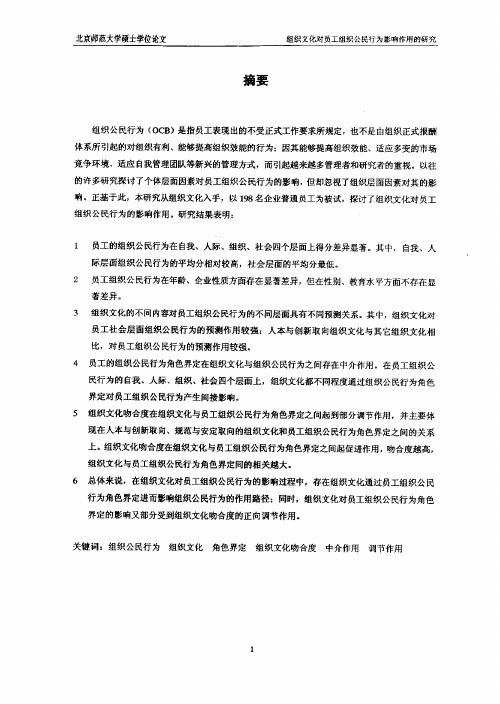
3 h d rn c l e n i h e rn iee t tr dme so s v d ee t T e f uu i n a i f
2 apc f , z i o nr i ae iat ec o o e a s e etoaeo ai tn e h hv s n cni un sm dm i T s s g r ao w s p i f n e n o n h g n gi l f o nn aae ' B ad r in s n cn il n nn aae ' B m f -n gr O , t e o i at ec o o-n gr O f om s C n h s i f e gi nu e n m f s C r o
组织文化吻合度在组织文化与员工组织公民行为角色界定之间 起到 部分调节作用,并主要体 现在人本与创新取向、 规范与安定取向的组织文化和员工组织公民 行为角色界定之间的关系 上。 组织文化吻合度在组织文化与员 工组织公民行为角色界定之间起促进作用, 吻合度越高, 组织文化与员工组织公民 行为角色界定间的相关越大. 总体来说,在组织文化对员工组织公民 行为的影响过程中,存在组织文化通过员 工组织公民 行为角色界定进而影响 组织公民 行为的作用路径;同时, 组织文化对员 工组织公民 行为角色 界定的影响又部分受到组织文化吻合度的正向调节作用。 关键词:组织公民 行为 组织文化 角色界定 组织文化吻合度 中介作用 调节作用
响。正基于此,本研究从组织文化入手,以18 9 名企业普通员工为被试, 探讨了 组织文化对员工 组织公民行为的影响作用。 研究结果表明:
浅述组织公民行为及其对组织的影响
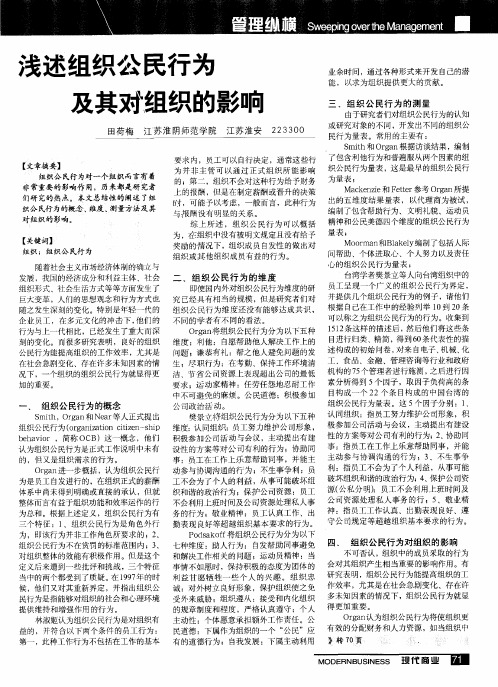
业余 时间,通过各种形式来开发 自己的潜 能 ,以求为组 织提供 更大的贡献。
及其对组织的影响
田荷梅 江 苏淮 阴师范 学院 江苏 淮安 2 3 0 3 0 2
【 文章摘要 】 组织公 民行 为对一个组织而言有着 非 常重要 的影响作 用,历来都是研 究者 们 研 究的热 点 。 本文 总 结 性 的 阐 述 了组 织公民行为的概念、 维度 、 测量方法及其 对组织的影响。 【 关键词】
樊景立将 组织公民行为分为以下五种 认同组织 :指员工努力维护公司形象 ,积 维度: 同组织 :员工努力维护公司形象 , 极参加公司活动 与会议 ,主动提 出有建设 认 2 协助同 积极参加公司活 动与会议 ,主动提 出有 建 性的方案等对公 司有利的行为; 、 事:指 员工在工作上 乐意帮助 同事 ,并能 设性 的方案等对 公 司有利 的行为 ;协助 同 、不生事争 事 :员工在 工作 上乐 意帮助同事 ,并能主 主动参与协调沟通 的行为 ;3
动 参与协调沟通的行 为 ;不生事争利 :员 工 不会 为了个人的利益 ,从事可能破坏组 织 和谐 的政治行为 ;保护 公司资源 :员工 不会利用上班时间及公司 资源处理私人事 务 的行为 ;敬业精神 :员工认 真工 作、出 勤表现 良好等超 越组织基本要求 的行为 。 P da of o s k f 将组织公 民行为分为 以下 七种维度 :助人行为 :自发帮助 同事避免 和解决工作相关的 问题 ;运动 员精神 :当 事情不如愿时 ,保持积极的态度为 团体的
组 织 ;组 织公 民行 为
三 组 织 公 民行 为的测 量
由于研究者们对组织公 民行为的认知 或研究对象的不同 ,开发 出不同的组织公 民行 为量 表。常用 的主要有 : S t mi h和 Ora g n根据访谈结果 ,编制 了包含利他行为和普遍服从两个因素的组 织公 民行为量表 ,这是最早的组织公 民行 为量表 ; Ma k n i和 F t r cez e et 参考 Ora e g n所提 出的五 维度结果量表 ,以代理商为被试 ,
樊景立版的组织公民行为量表
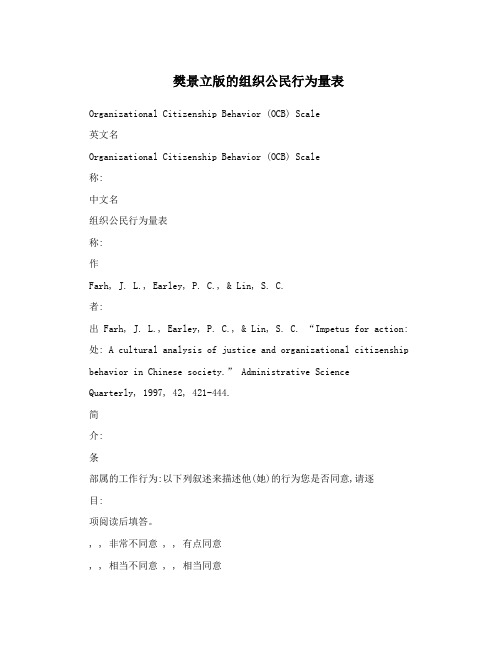
樊景立版的组织公民行为量表Organizational Citizenship Behavior (OCB) Scale英文名Organizational Citizenship Behavior (OCB) Scale称:中文名组织公民行为量表称:作Farh, J. L., Earley, P. C., & Lin, S. C.者:出Farh, J. L., Earley, P. C., & Lin, S. C. “Impetus for action: 处: A cultural analysis of justice and organizational citizenship behavior in Chinese society.” Administrative ScienceQuarterly, 1997, 42, 421-444.简介:条部属的工作行为:以下列叙述来描述他(她)的行为您是否同意,请逐目:项阅读后填答。
, , 非常不同意 , , 有点同意, , 相当不同意 , , 相当同意, , 有点不同意 , , 非当同意, , 不能确定Identification with the company认同组织Eager to tell outsiders good news about the company and clarifytheirmisunderstandings主动对外介绍或宣传公司优点,或澄清他人对公司的误解。
Willing tostand up to protect the reputation of the company. 努力维护公司形象,并积极参与有关活动。
Makes constructive suggestions that can improve the operation of the company.主动提出建设性的改善方案,供公司有关单位参考。
- 1、下载文档前请自行甄别文档内容的完整性,平台不提供额外的编辑、内容补充、找答案等附加服务。
- 2、"仅部分预览"的文档,不可在线预览部分如存在完整性等问题,可反馈申请退款(可完整预览的文档不适用该条件!)。
- 3、如文档侵犯您的权益,请联系客服反馈,我们会尽快为您处理(人工客服工作时间:9:00-18:30)。
樊景立版的组织公民行为量表Organizational Citizenship Behavior (OCB) Scale英文名Organizational Citizenship Behavior (OCB) Scale称:中文名组织公民行为量表称:作Farh, J. L., Earley, P. C., & Lin, S. C.者:出Farh, J. L., Earley, P. C., & Lin, S. C. “Impetus for action: 处: A cultural analysis of justice and organizational citizenship behavior in Chinese society.” Administrative ScienceQuarterly, 1997, 42, 421-444.简介:条部属的工作行为:以下列叙述来描述他(她)的行为您是否同意,请逐目:项阅读后填答。
, , 非常不同意 , , 有点同意, , 相当不同意 , , 相当同意, , 有点不同意 , , 非当同意, , 不能确定Identification with the company认同组织Eager to tell outsiders good news about the company and clarifytheirmisunderstandings主动对外介绍或宣传公司优点,或澄清他人对公司的误解。
Willing tostand up to protect the reputation of the company. 努力维护公司形象,并积极参与有关活动。
Makes constructive suggestions that can improve the operation of the company.主动提出建设性的改善方案,供公司有关单位参考。
Actively attends company meetings.以积极的态度参与公司内相关会议。
Altruism toward colleagues协助同事Willing to assist new colleagues to adjust to the work environment. 主动帮助新进同仁适应工作环境。
Willing to help colleague solve work-related problems. 乐意协助同仁解决工作上的困难。
Willing to cover work assignments for colleague when needed. 主动分担或代理同事之工作。
Willing to coordinate and communicate with colleagues. 主动与同事协调沟通。
Impersonal harmony不生事争利 (人际和睦)Often speaks ill of the supervisor or colleagues behind their backs. (R) 经常在背后批评主管或谈论同事之隐私。
(R)Uses illicit tactics to seek personal influence and gain withharmful effecton interpersonal harmony in the organization. (R)在公司内争权夺利,勾心斗角,破坏组织和谐。
(R)Uses position power to pursue selfish personal gain. (R)假公济私,利用职权谋取个人利益。
(R)Takes credits, avoids blames, and fights fiercely for personal gain. (R) 斤斤计较,争功诿过,不惜抗争以获得个人利益。
(R)Protecting company resources公私分明Conducts personal business on company time (e.g., trading stocks,shopping, going to barber shops). (R)利用上班时间处理私人事务,如买股票,跑银行,逛街,购物,上理容院(((等。
(R)Uses company resources to do personal business (e.g., company phones, copy machines, computers, and cars). (R)利用公司资源处理私人事务,如:私自利用公电话,复印机,计算机,公务车(((等。
(R)Views sick leave as benefit and makes excuse for taking sick leave. (R) 经常借口请假,视为福利。
(R)Conscientiousness敬业守法Often arrives early and starts to work immediately.上班时经常提早到达,并着手处理公务。
Takes one’s job seriously and rarely makes mistakes.工作认真,并且很少出差错。
Complies with company rules and procedures even when nobody watches and no evidence can be traced.即使无人注意或无据可查时,亦随时遵守公司规定。
Does not mind taking new or challenging assignments.从不挑选工作,尽可能接受新的或困难的任务。
Tries hard to self-study to increase the quality of work outputs.为提升工作品质,而努力自我充实。
信度:效度:备注:Organizational Justice Scale英文名Organizational Justice Scale称:中文名组织公平量表称:作Jason A. Colquitt者:出 Colquitt, J. A. (2001). "On the Dimensionality of处: Organizational Justice: A Construct Validation of a Measure." Journal of Applied Psychology 86(3): 386-400.简介:条Procedural justice目:The following items refers to the procedures used to arrive at your (outcome). To what extent:1.Have you been able to express your views and feelings during these procedures?2.Have you had influences over the (outcome) arrived at by those procedures?3.Have those procedures been applied consistently?4.Have those procedures been free of bias?5.Have those procedures been based on accurate information?6.Have you been able to appeal the (outcome) arrived at by those procedures?7.Have those procedures upheld ethical and moral standards?Distributive justiceThe following items refer to your (outcome). To what extent:1.Dos your (outcome) reflect the effort you have put into your work?2.Is your (outcome) appropriate for the work you have completed?3.Does your (outcome) reflect what you have contributed to theorganization?4.Is your (outcome) justified, given your performance?Interpersonal justiceThe following items refer to (the authority figure who enacted the procedure). To what extent:1.Has (he/she) treated you in a polite manner?2.Has (he/she) treated you with dignity?3.Has (he/she) treated you with respect?4.Has (he/she) refrained from improper remarks or comments?Informational justiceThe following items refer to (the authority figure who enacted the procedure). To what extent:1.Has (he/she) been candid in (his/her) communication with you?2.Has (he/she) explained the procedures thoroughly?3.Were (his/her) explanations regarding the procedures reasonable?4.Has (he/she) communicated details in a timely manner?5.Has (he/she) seemed to tailor (his/her) communications to individuals’specific needs?信度:效度:备注:Procedural Justice英文名称: Procedural Justice中文名称: 程序公平Farh, J.-L., P. C. Earley, et al. 作者:Farh, J.-L., P. C. Earley, et al. (1997). "Impetus for action: A cultural analysis of 出处:justice and..." Administrative Science Quarterly 42(3): 421.简介:条目: Farh, J.-L., P. C. Earley, et al. (1997). "Impetus for action: A cultural analysis of justice and..." Administrative Science Quarterly 42(3): 421.The sample for this study consisted of employees drawn from eight companies inthe electronics industry of Taiwan. All eight companies were locally owned and were members of the 500 largest companies in Taiwan. Thirty toforty matching questionnaires were distributed to supervisors and subordinates in each company. The sample consisted mainly of low to mid-level managers, engineers,salespersons, and clerical staff.Participation1.Managers at all levels participate in pay and performanceappraisal decisions;2.Through various channels, my company tries to understandemploy ees’opinions regarding pay and performance appraisal policies and decisions.3.Pay decisions are made exclusively by top management in my company; others are excluded from this process; (R)4.My company does not take employees’ opinions into account in designing payand performance appraisal policies. (R)Cronbach alpha was .717-point scale (1=strongly disagree, 7=strongly agree)Appeal MechanismThe company has a formal appeal channel;The company imposes a time limit within which the responsibleparties mustrespond to the employee’ appeal;Employees’ questions concerning pay or performance appraisal are usuallyanswered promptly and satisfactorily.Cronbach alpha was .817-point scale (1=strongly disagree, 7=strongly agree)Cronbach alpha was .71 7-point scale (1=strongly disagree,7=strongly agree) 信度:效度:备注:Justice Scale英文名Justice Scale称:中文名公平问卷称:作Niehoff, B. P., & Moorman, R. H.者:出 Niehoff, B. P., & Moorman, R. H. (1993). Justice as a mediator 处: of the relationship between methods of monitoring andorganizational citizenship behaviors. Academy of Management Journal, 36(3), 527-556.简介:条 Sample: The employees and general managers of a national movie 目: theater management company that operated 11 theaters in a large southwestern city were studied. The employees (N = 213) averaged 19.9 years of age and nearly two years of experience working in the theaters.A majority had completed high school, but only 17 percent had completed college. Each theater was under the authority of a general manager; thus, 11 general managers took part in the study. The number of employees per theater varied from 15 to 45. At each location, a group of assistant managers aided the general manager in the operation of the theater, but there were no direct lines of authority between these assistants and specific employees. In fact, the vice president for human resources described the assistant managers as a pool of assistants who could be assigned to any shift on any day. The one constant at each theater was that each general manager hadultimate responsibility for the operation and was on-site formost of the theater's hours of business. The assistant managers were not included in the data for this study.The employees completed a survey describing their perceptionsof distributive and procedural justice and the monitoring behaviorsof their general manager. Since the assistant managers worked various shifts but the general managers remained on-site for most of the working hours, we considered the general managers the appropriate referents for themeasurement of leader monitoring behaviors. The general managers provided data for the measures of organizational citizenship behavior; some general managers assessed OCB for 15 employees, and some assessed 45 employees.All surveys were completed on company time. Since data were being collected from two sources, employees and general managers, we asked all participants to put their names on the surveys but took precautions to insure confidentiality. Each employee received an envelope in which to seal the completed survey and mailed it directly to us. In total, 213 out of 260 employee surveys were returned for a response rate of 81 percent. Conversations with the company's vice president for human resources suggested that the demographic characteristics of the respondents reflected those of the general population of employees at the theaters.All items used a seven-point response format.Distributive justice1. My work schedule is fair.2. I think that my level of pay is fair.3. I consider my work load to be quite fair.4. Overall, the rewards I receive here are quite fair.5. I feel that my job responsibilities are fair.Formal procedures1. Job decisions are made by the general manager in an unbiasedmanner.2. My general manager makes sure that all employee concernsare heard before job decisions are made.3. To make job decisions, my general manager collects accurateand complete information.4. My general manager clarifies decisions and providesadditional information when requested by employees.5. All job decisions are applied consistently across allaffected employees.6. Employees are allowed to challenge or appeal job decisionsmade by the general manager.Interactional justice1. When decisions are made about my job, the general managertreats me with kindness and consideration.2. When decisions are made about my job, the general managertreats me with respect and dignity.3. When decisions are made about my job, the general manageris sensitive to my personal needs.4. When decisions are made about my job, the general managerdeals with me in a truthful manner.5. When decisions are made about my job, the general managershows concern for my rights as an employee.6. Concerning decisions made about my job, the general managerdiscusses the implications of the decisions with me. 7. The general manager offers adequate justification fordecisions made about my job.8. When making decisions about my job, the general manageroffers explanations that make sense to me.9. My general manager explains very clearly any decision madeabout my job.信 The CFI for the three justice dimensions was .92. This scale 度: was based on one used by Moorman (1991) and had reportedreliabilities above .90 for all three dimensions.效度:备注:OCB Scale英文名OCB Scale称:中文名组织公民行为问卷称:作Niehoff, B. P., & Moorman, R. H.者:出 Niehoff, B. P., & Moorman, R. H. (1993). Justice as a mediator 处: of the relationship between methods of monitoring andorganizational citizenship behaviors. Academy of ManagementJournal, 36(3), 527-556.简介:条 Sample: The employees and general managers of a national movie 目: theater management company that operated 11 theaters in a large southwestern city were studied. The employees (N = 213) averaged 19.9 years of age and nearly two years of experience working in the theaters. A majority had completed high school, but only 17 percent had completed college. Each theater was under theauthority of a general manager; thus, 11 general managers took part in the study. The number of employees per theater varied from 15 to 45. At each location, a group of assistant managers aided the general manager in the operation of the theater, butthere were no direct lines of authority between these assistants and specific employees. In fact, the vice president for human resources described the assistant managers as a pool of assistants who could be assigned to any shift on any day. The one constant at each theater was that each general manager had ultimate responsibility for the operation and was on-site formost of the theater's hours of business. The assistant managers were not included in the data for this study.The employees completed a survey describing their perceptionsof distributive and procedural justice and the monitoring behaviors of their general manager. Since the assistant managers worked various shifts but the general managers remained on-site for most of the working hours, we consideredthe general managers the appropriate referents for the measurementof leader monitoring behaviors. The general managers provided data for the measures of organizational citizenship behavior; some general managers assessed OCB for 15 employees, and some assessed 45 employees.All surveys were completed on company time. Since data were being collected from two sources, employees and general managers, we asked all participants toput their names on the surveys but took precautions to insure confidentiality.Each employee received an envelope in which to seal the completed survey and mailed it directly to us. In total, 213 out of 260 employee surveys were returned for a response rate of 81 percent. Conversations with the company's vice president for human resources suggested that the demographic characteristics of the respondents reflected those of the general population of employees at the theatersAltruism1. Helps others who have heavy work loads.2. Helps others who have been absent.3. Willingly gives of his/her time to help others who have workrelated problems.4. Helps orient new people even though it is not required. Courtesy1. Consults with me or other individuals who might be affected by his/her actions or decisions.2. Does not abuse the rights of others.3. Takes steps to prevent problems with other workers.4. Informs me before taking any important actions. Sportsmanship1. Consumes a lot of time complaining about trivial matters. (R)2. Tends to make "mountains out of molehills" (makes problems bigger than they are). (R)3. Constantly talks about wanting to quit his/her job. (R)4. Always focuses on what's wrong with his/her situation, rather than the positive side of it. (R)Conscientiousness1. Is always punctual.2. Never takes long lunches or breaks.3. Does not take extra breaks.4. Obeys company rules, regulations and procedures even when no one is watching.Civic virtue1. Keeps abreast of changes in the organization.2. Attends functions that are not required, but that help thecompany image.3. Attends and participates in meetings regarding theorganization.4. "Keeps up" with developments in the company.Items denoted with ( R ) are reverse scored.信 The reliabilities were over .70 for each dimension, and all 度: items used a seven-point response format.效度:备注:cognition-and affect-based trust 英文名cognition-and affect-based trust称:中文名基于情感和认知的信任称:作Kok-Yee Ng (黄国燕) and Roy Y. J. Chua (蔡泳瑜) 者:出 Management and Organization ReviewVolume 2 Page 43 - March 处: 2006doi:10.1111/j.1740-8784.2006.00028.x Volume 2 Issue 1 简介:Do I contribute more when I trust more? Differential effects of 条cognition-and affect-based trust 目:Kok-Yee Ng (黄国燕) and Roy Y. J. Chua (蔡泳瑜)基于McAllister (1995)的信任量表基于情感的信任1. 你能够与他们自由地分享想法、感受和希望。
